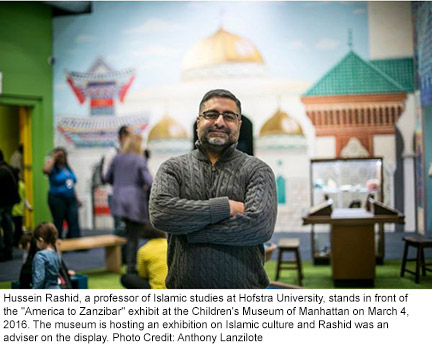Press
Children’s Museum exhibit aims to bridge gap between Islam, West
03/10/2016

![]()
NEWSDAY: Hussein Rashid, who grew up in Elmont surrounded by friends from across the globe, is using his American experience to bridge the gap between Muslim and Western societies in a new museum exhibit.
“Elmont was really very diverse,” said Rashid, 42, who teaches Islamic studies at Hofstra University in Hempstead and is a consultant for “America to Zanzibar: Muslim Cultures Near and Far,” a new exhibition at the Children’s Museum of Manhattan.
Rashid, who was born in Rego Park, Queens, said his New York multiethnic and cultural experience had him reflect on his own Muslim heritage that inspired a career in Islamic studies.
“I grew up in the ’70s and ’80s in a time when people had boundaries, but where there was this intermingling of people that is ideal when growing up. I had friends from Trinidad, Haiti, Jamaica, Colombia and friends from traditional Irish and Italian families. Today they are still my friends,” Rashid said.
The museum’s interactive exhibition exposes schoolchildren to different Islamic cultures through the colors, smells and century-old artifacts that recreate the Muslim world. Life-size photographs of an Egyptian market set the scene of a local bazaar where children can smell spices and fruits commonly sold.
Sadie “is at the perfect age for this exhibit,” said her grandmother Cynthia Beck of Manhattan, who put Sadie, 2, in a Senegalese dress. “She is curious and it’s a hands-on experience. She may not see or know the differences now in the culture, but she gets to see the bright colors and that it is different.”
The children not only play dress up but get to serve tea in an Islamic designed tearoom with replica Turkish ceramic dishes.“Our goal is to have children deal with differences in a healthy, positive way and encourage them to be inquisitive while exploring the world instead of running away from its differences,” Rashid said, an experience not so different from his years growing up in Elmont.
Visitors also hear the stories of Muslims living in America, such as Puerto Rican urban artist Jorge “Fabel” Pabon, 50, who tells his story of growing up Catholic in Spanish Harlem and who became a follower of Islam at age 24.
“My story is that you can still be an individual and have your own identity, and that being Muslim doesn’t mean you have to adapt to an Arab culture,” Pabon said. He is a member of the Alianza Islamica in Manhattan, an organization that recognizes the cultural influence of the Moors, who conquered Spain in the 700s and were Islamic in faith.
Leyla Hamedi, 30, of Manhattan, is half Turkish and half Iranian. A museum employee, she donated her grandfather’s lapel pin that depicts the profile of Turkey’s first President Mustafa Kemal Ataturk.
“My grandfather wore that pin to honor Ataturk’s belief in a progressive and modern society,” she said. “The exhibit shows the difference between religious views and cultural views and that they are not always the same. ”
By Maria Alvarez Special to Newsday




